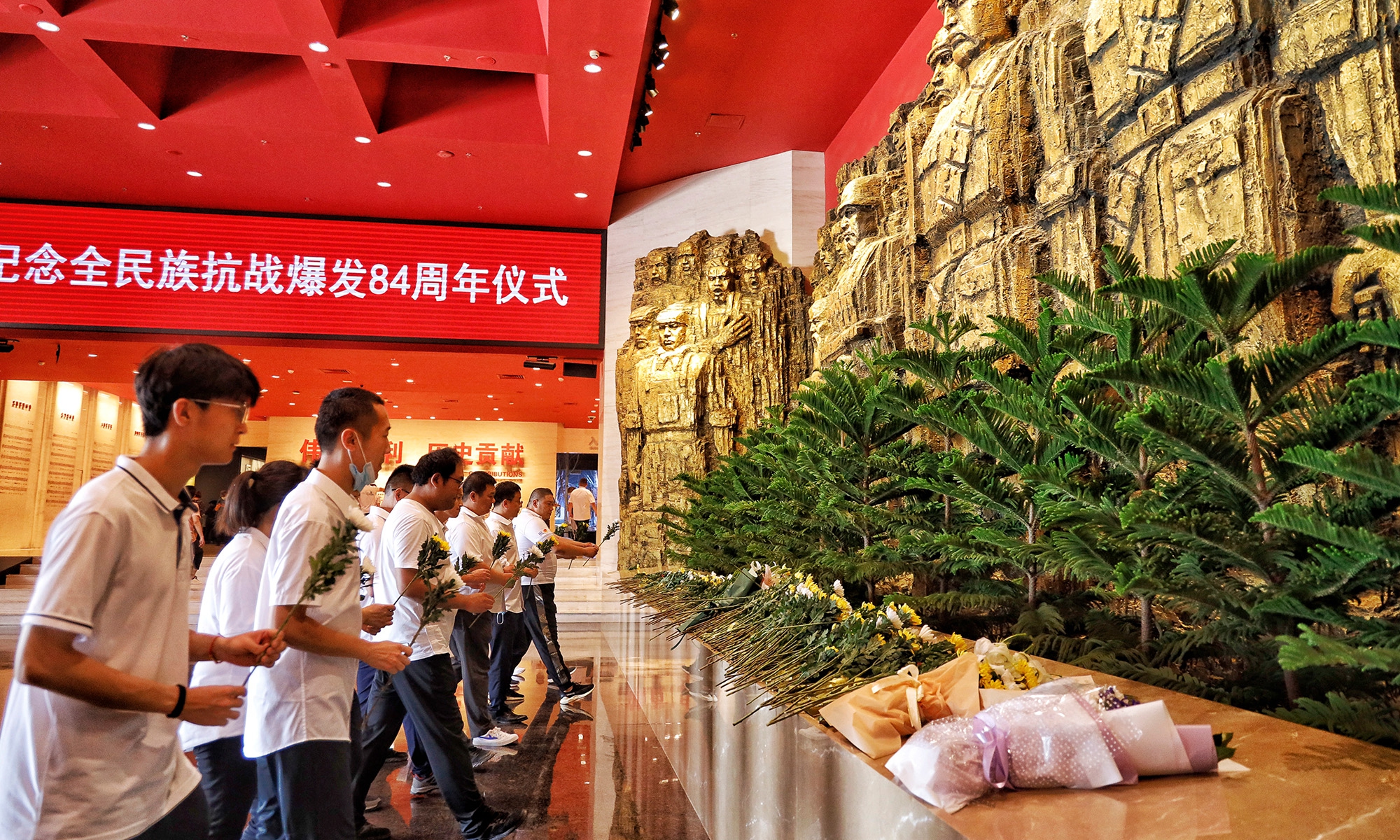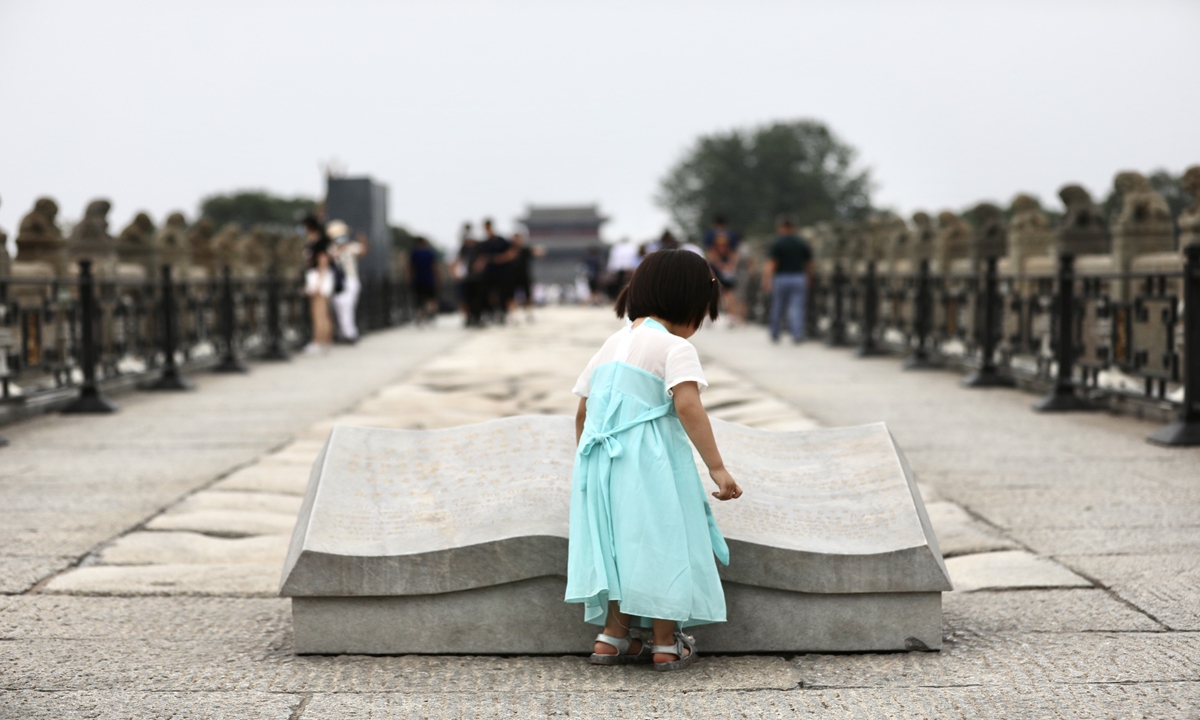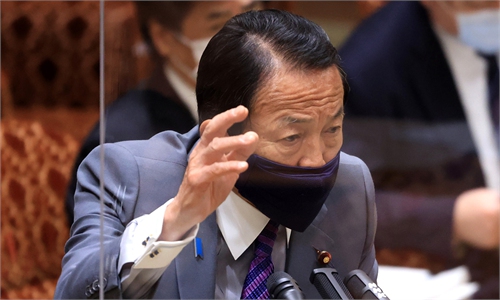
Photo: Li Hao/GT
As the bell of peace struck 13 times in a row, public representatives on Wednesday morning observed a moment of silence in memory of the revolutionary martyrs and war victims at the Memorial Hall of the Victims of the Nanjing Massacre by Japanese Invaders in East China's Jiangsu Province, 84 years after the Lugou Bridge Incident which took place on July 7, 1937, marking the beginning of the all-out War of Resistance against Japanese Aggression (1931-45).
To commemorate the 84th anniversary of the full-scale outbreak of the Chinese People's War of Resistance against Japanese Aggression, 24 memorial halls in 14 provincial-level regions on Wednesday held grand memorial ceremonies to express grief and respect for the heroes by visitors' reciting poetry, singing songs and laying flowers.
Along with more than 60 history museums, the Chinese People's Anti-Japanese War Memorial Hall in Beijing on Wednesday launched a special exhibition, which features more than 500 war relics and more than 80 precious historical pictures, showing the bloody struggle of the Chinese people and the outstanding leadership of the Communist Party of China (CPC).
In memory of the anniversary, the aerial defense alarm sounded on Wednesday at 10 am in all regions in North China's Hebei Province, one of the major battlefields of the 14-year war of resistance.
The national-scale grand commemoration of the war against Japan's aggression was buoyed by the strong national patriotism which was pushed to a climax by the centennial celebration of the CPC last week. In sharp contrast, Chinese public's perception toward Japan has dipped to a new low after Tokyo acted as Washington's vassal in attacking China and straddled China's bottom-line issues, such as the island of Taiwan.
As the Chinese show more eagerness for national reunification after having tackled extreme poverty, some Japanese politicians recently made "extremely wrong and dangerous" remarks on the Taiwan question.
Experts reached by the Global Times on Wednesday said that many Chinese people have learned from the humiliation of the past century and more that only strength can safeguard peace, dignity and core interests.
Meanwhile, unlike some Western countries, China's strength does not pose a threat to the world - it is a force for safeguarding world peace, they said.

A young girl stands on Lugou Bridge in Beijing on Wednesday, which marks the 84th anniversary of the Lugou Bridge Incident taking place on July 7, 1937, considered the start of Chinese people's all-out War of Resistance against Japanese Aggression (1931-45). Photo: IC
Remember the past
"It is difficult for people born in peaceful time to imagine a distant and abstract war period, so we need this educational activity to remind our students to remember history and devote their youth to the cause of the national rejuvenation," a professor surnamed Li from the Beijing-based Institute of Scientific and Technical Information of China told the Global Times on Wednesday in front of the exhibition in the Chinese People's Anti-Japanese War Memorial Hall, located near Lugou Bridge in southwest Beijing.
A staffer with the memorial hall told the Global Times on Wednesday that the 3,000 tickets for the day's exhibition were already booked out. In addition to parents and children, there were quite a few tour groups mainly composed of young people.
The exhibits include clothing, guns used by Chinese soldiers, important documents and publications. In addition to telegrams and letters from generals, there are also photos of martyrs with their families before the war and letters from their parents.
"We should thank our forerunners, who sacrificed their own lives to build a peaceful life that we can enjoy… I will not take peace for granted any more and try to become a pillar of our country," an elementary school student surnamed Gao told the Global Times in the exhibition hall.
A student surnamed Liu told the Global Times on Wednesday that his elementary school in Taiqian county, Central China's Henan Province, 470 kilometers from Beijing, arranged a screening of the film the Lugou Bridge Incident for them.
In sharp contrast, the Japanese Embassy in China did not post a single word on its Weibo or WeChat accounts on Wednesday.
Japanese netizen expressed their worries that Japanese people are going out to the world without being informed of the historic facts due to the revisions of historic events made in Japan's textbooks and media.

Photo: Li Hao/GT
Facts behind 'nationalism'
The topic "84th anniversary of July 7 Incident" was the highest trending topic on Wednesday on Sina Weibo, with many netizens paying tribute to the Chinese martyrs who sacrificed their lives during the incident. As of press time, the topic has been viewed more than 2.2 billion times.
Another topic "Today's China is no longer that of 1937" is also trending. Many netizens said they are proud of the achievements China has made under the leadership of the Communist Party of China (CPC) and they will not forget the hardship Chinese people went through during the period of Japanese aggression.
Many netizens posted photos they took at Lugou Bridge in memory of the martyrs. "The bullet holes can still be seen on the bridge, a constant reminder that we should never forget our history and should strive to become stronger," said a netizen.
On June 30, Japanese tech giant Sony found itself in hot water after announcing it planned to release new smart phone on July 7. Although Sony deleted the post on Weibo and apologized, the company's action was accused as "intentional" by some netizens. Sony had canceled relevant activities.
However, the fervent patriotism and togetherness in China, which was recently fueled by Japanese Deputy Prime Minister Taro Aso who said Japan would defend the island of Taiwan together with the US if a war breaks out across the Taiwan Straits, has been demonized by some Western media and politicians who lack knowledge of China's history.
Senior Japanese officials have recently issued outrageous statements related to the island of Taiwan. On June 24, Japanese Defense Minister Nobuo Kishi said the island's peace and stability are directly linked with that of Japan. Also in June, Japanese Vice Defense Jinister Yasuhide Nakayama told a US think tank that it is necessary to protect the island of Taiwan as a "country."
Compared with some right-wing politicians in Japan who glorify or even refuse to admit the Japan's aggression against China, the commemorative activities in China are precisely to remember the history in a right attitude, analysts said.
"Forgetting history is a betrayal, and the war may repeat itself if it is forgotten," Song Zhongping, a military expert and TV commentator, told the Global Times on Wednesday, urging some Japanese politicians to "stop talking nonsense and making troubles."
Song said that some Western and Japan politicians believe that the international community was the law of the jungle, so the aggressive stance that China takes is not unjustified, Song said.
Chinese Foreign Ministry spokesperson Zhao Lijian on Tuesday mentioned the history of the Japanese militarists' invasion of China in the 20th century, saying that "today's China is not what it was then" but the Japanese have not learned the lessons of history deeply.
Instead of the so-called China threats, some Japanese politicians with a militaristic mentality are still active in colluding with the US, which is the real destabilizing factor threatening peace, Li Haidong, a professor at the Institute of International Relations of China Foreign Affairs University, told the Global Times on Wednesday.
Li said from its history of humiliation, China knows that only with strength can it defend its national dignity and core interests. Meanwhile, China's strength does not pose a threat to the world but is a force for maintaining world peace.
"The CPC wants to lead the Chinese people to a life of dignity and freedom from slavery and oppression, and a better life in which China's sovereign territory is no longer infringed upon. Therefore, China must be strong and will be strong," Song said.
History cannot be forgotten or tampered with, and China will firmly uphold the dignity of history as well, Song said.



